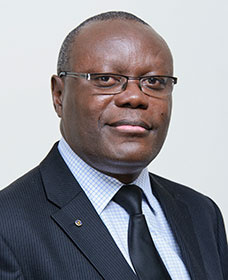
Published in The Independent; Issue 513 23rd-29th March, 2018
Written by Julius Businge
Mr. Martin A. Nsubuga is the Acting Chief Executive Officer (CEO) at the Uganda Retirement Benefits Regulatory Authority (URBRA). He takes up the position with a wealth of experience to ensure that the gains of the past five years are sustained. He is concurrently serving as the Director of Supervision and Compliance. He has been pivotal in setting up URBRA’s institutional capabilities. He spoke to The Independent’s Julius Businge about the industry’s outlook.
Uganda’s pension sector is evolving. What should the market expect from your leadership?
When this institution was being set up, the government hoped to expand the scope and efficiency, bring all the entities that were once unregulated under the armpit of the regulator. The mandate of URBRA is to ensure that members’ savings are secure. We have made great strides in creating a robust supervisory framework and I intend to leverage on these achievements while ensuring that scheme operations are effective and efficient. I will have to enforce the law as it has been given to us to implement. URBRA is less than six years old, and as such, we cannot start by enforcing regulation from the onset. The first phase which covered two years was bringing onboard all the entities that are required to be regulated and ensuring that they comply with all the requirements. We have passed that phase.Now we are looking at a situation of enforcing the law which we will do gradually.
What kind of management philosophy are you using to spearhead these efforts?
I try to avoid micro managing and let my employees work independently. We have been building capacity with focus on the needs of the Retirement Benefits Sector. I expect my staff to continually be responsive to the requirements of the regulatory business culture and always uphold professional standards.
Briefly share your description of Uganda’s Pension Sector?
Currently, about two million of Uganda’s working population is covered under some form of retirement benefits arrangement. The sector is comprised of National Social Security Fund (NSSF), the Public Service Pension Scheme, Armed Forces Pension Scheme, Parliamentary Pension Scheme, Supplementary Voluntary Occupational Schemes, Supplementary Voluntary Informal Sector Schemes and the Social Assistance Grant for Empowerment (SAGE). The sector is covering less than 10% of the population leaving out 90%. What I see as a long term goal for policy makers would be to champion a policy to expand and have other people onboard. In terms of regulation, there are Funds established under the Act of Parliament and those established under Trustee Deeds. We have 63 licensed pension schemes.
Cabinet recently shelved the move to open up the sector for more players to compete with the NSSF and now plans to amend the NSSF Act to include proposed reforms in the bill. What is your take on that?
Cabinet’s role is to direct government policy and make decisions about national issues. Ours is to implement government policy. We shall continue to ensure that all schemes including NSSF are capable of delivering strong governance, sustainability and full transparency. That said the Retirement Benefits Sector requires a comprehensive package of reforms.
But does the new move come with any opportunities?
The move is expected to enhance the ability of stakeholders to identify appropriate supportive policy and legal reforms in the Retirement Benefits Sector. In any case, the mandate of the Authority will not change. What we want is a market and regulatory environment that will deliver a well-functioning Retirement Benefits System, which protects the interests of members and their beneficiaries. The only difference is that NSSF has the largest asset base (Shs9 trillion). The other schemes have around Shs1.6 trillion today. Before URBRA was established, these other schemes were not known.Whether the sector opens up or not, URBRA will still regulate NSSF. Besides that, the government has been monitoring NSSF. The regulatory policy that we have today is still good enough to deliver results whether there is one player or many. In terms of policy, there is the Ministry of Gender which is responsible for social protection as an umbrella and Ministry of Finance which is responsible for the pension funds and schemes establishment. The two consult us where possible and we guide them accordingly. In terms of regulation, there is URBRA Act, the NSSF Act, Public Service Pensions Act, Parliamentary Pension Act and Trustee Deeds. These acts have a lot of regulations which we have championed and we still continue to develop more new regulations to guide the sector in many areas. Generally speaking, we have a strong regulatory framework because we have not had serious complaints that have come on our way.
You say NSSF is violating section 33 of the URBRA Act regarding fund management. Why not punish them?
The URBRA Act is clear and NSSF is expected to comply with it. The rationale for outsourcing the fund management function is primarily to mitigate governance and political risks. While cost efficiency is perceived to be the main reason for in-house fund management in some cases, low costs do not necessarily translate into better decisions and better returns. Over 70% of NSSF investment goes to government securities which do not require too much skill apart from knowing their liquidity profile, demand and maturity. In the proposed reforms, they want to amend the NSSF Act to allow them do their in-house fund management.
How best can our legal framework attract the informal sector into the pension sector?
We are in the process of developing a regulatory framework suitable for workers in the informal sector. Our intention is to develop a framework that will introduce retirement saving arrangements that take into account cash flow needs, income seasonality, competing spending priorities and alternative investment options. We know that the savings culture in Uganda is low. Ugandans save around 5% of their monthly earnings compared to Kenyans (23%), Tanzanians (13%) and Rwandans (18%). Government needs to make it easy, flexible for people to save. Savings must not be made mandatory. Let it be structured in a way that when I get money I will save it and when I don’t get I don’t save. But also the means to do it should be easy like the use of mobile money. There must be some incentives in terms of products, tax extended to people if the savings culture is to improve.
Where do you draw the line between regulation of the pension sector and running the economy?
There is no need to draw a line. The Retirement Benefits Sector is currently contributing over 9% to the country’s GDP, and is expected to contribute a larger share in the near future. In effect, what is important is to ensure that investments deliver decent retirement benefits for members. If this condition can be met by viable investment products, then Retirement Benefits Sector assets can support economic development projects. We are also helping in developing different asset classes that can be used to enhance economic growth of the country.
Why would one say that URBRA is not doing enough of their mandate?
URBRA was established to regulate and supervise the establishment, management and operation of retirement benefits scheme and scheme service providers in Uganda, and to protect the interests of members and beneficiaries. The initial years of URBRA focused more on schemes establishment and compliance with the licensing requirements. Like I said earlier, our focus has since been elevated to strengthening the supervisory framework including stronger monitoring of conduct and performance of schemes and service providers. What we need is to increase public awareness about the work of the Authority. The sector is becoming complex and so we need to prepare. Beyond Uganda, there are convergent requirements under the East African Community (EAC) protocols which some may look to be parallel to what had been thought before. We need to harmonize in that area.
From a regulatory perspective, what lessons are there for Uganda to learn from other developed pension sector markets across the world?
The key lesson must be preservation of pre and post retirement income. The current approach of paying lump sums in Uganda exposes savers to longevity risks as lifetime savings are more often than not squandered. In other jurisdictions, members that change jobs, leave employment or retire are required to preserve or transfer benefits in order to access future products that permit self-annuitisation. We must therefore introduce sustainable options that provide a regular cash-flow during retirement such as programmed withdrawals, income draw downs and annuities if we are to guarantee old age security. In addition, if you look at our sector, we encourage occupational schemes to develop. Chile has less than 10 Pension Funds similar to NSSF and everyone subscribes to that because there is ease of regulation. Kenya has over 1,000 schemes but we see a move from occupational schemes to umbrella schemes. For Uganda, it is a trend likely to take the Kenyan direction.
Basing on the strong regulatory framework that you say we have, where do you see the future of the sector going forward?
We see a very vibrant, robust and well regulated sector with increased coverage and asset portfolio. We are adapting to modern supervisory tools and we will continue to ensure that schemes under our supervision are strong in all aspects as a way of ensuring that people’s savings are secure.



